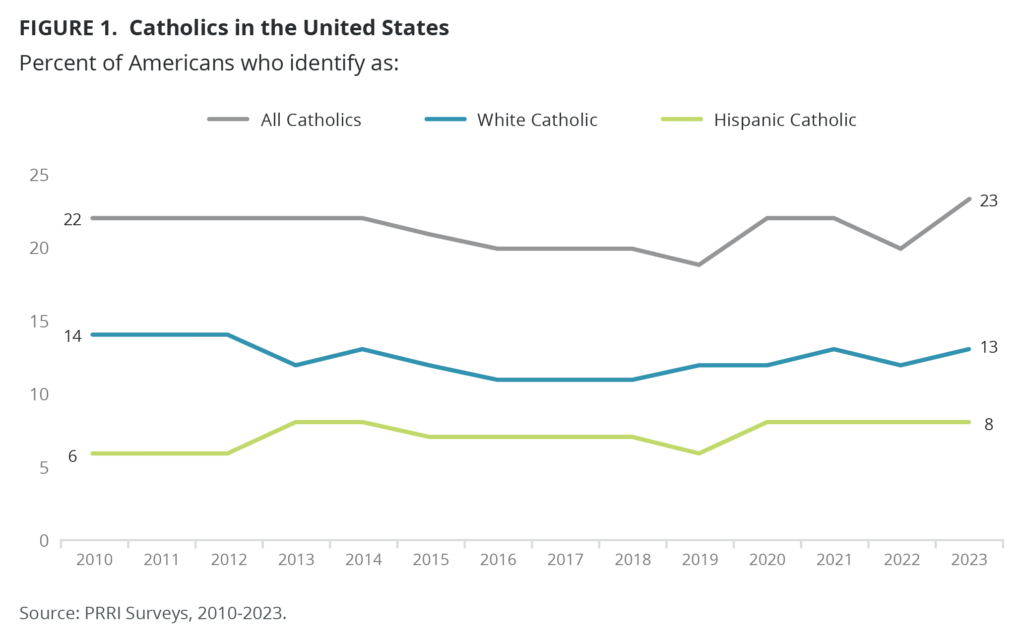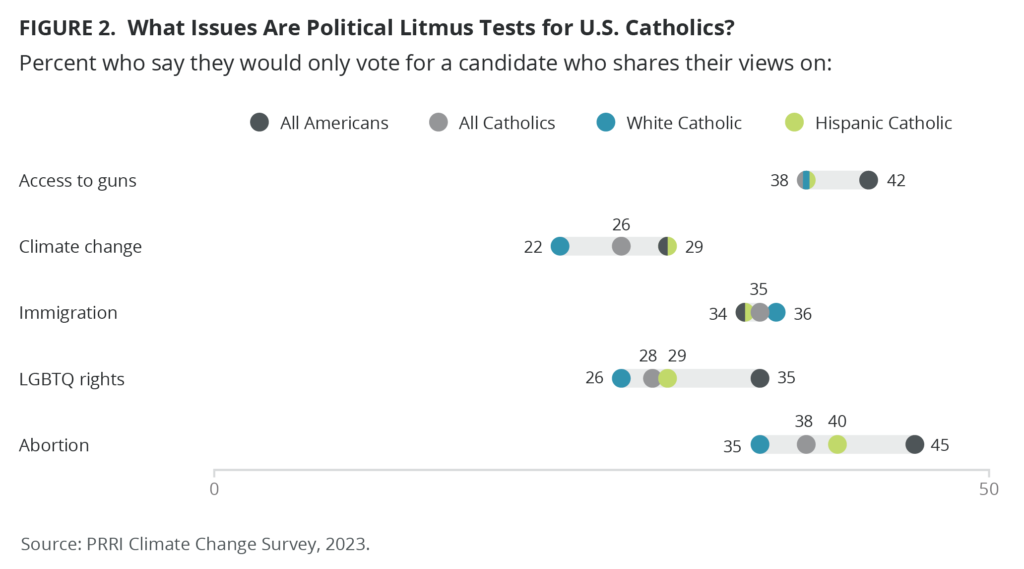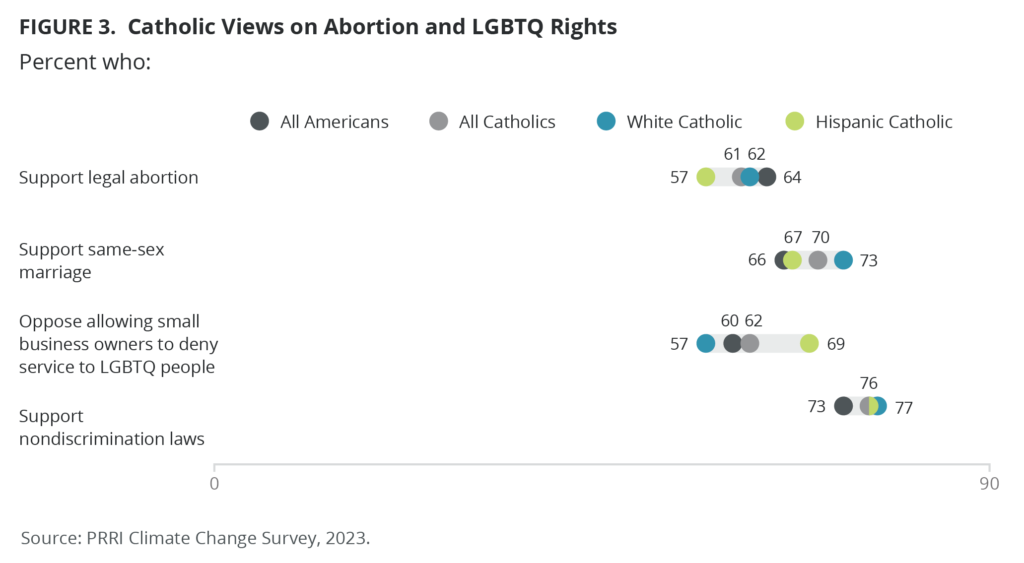Last week, Pope Francis opened a global Synod in Rome titled “For a Synodal Church: Communion, Participation, Mission.” In preparation for this ecclesiastical event, various Catholic dioceses have undertaken the task of collecting input from parishioners. The synod’s inclusion of the perspectives of lay people, especially women, is a noteworthy departure for the Catholic Church.
When it comes to understanding the evolving landscape of American Catholics, data from PRRI surveys can shed light on important dynamics. This Spotlight examines U.S. Catholics’ views on social and political issues including access to guns, climate change, immigration, abortion, and LGBTQ rights, as well as Catholic perspectives on the importance of religion and satisfaction with religious leadership.
Since 2010, the percentage and composition of Catholics in the United States have remained stable. In June 2023, 23% of Americans identified as Catholic, with white Catholics making up 13% of the population and Hispanic Catholics making up 8%, similar to 2010, when 14% of Americans were white Catholics and 6% were Hispanic Catholics, with a total of 22% of Americans who identified as Catholic.

Key Political and Social Issues for U.S. Catholics
Access to Guns
When asked whether a candidate’s views on access to guns would affect their vote, 38% of American Catholics say they would only vote for someone who shares their views, compared with over half (51%) who say they consider a candidate’s views on guns as just one of many important factors, and 10% who do not see access to guns as a major issue. Among both white Catholics (38%) and Hispanic Catholics (38%), the percent who say they would only vote for someone who shares their views on access to guns is the same.
Climate Change
When asked how a candidate’s views on climate change might affect their vote, 26% of Catholics say they would only vote for someone who shares their views, compared with about half (51%) who say they would consider a candidate’s position on climate change as just one of many important factors, and 22% who do not see climate change as a major issue. Hispanic Catholics (29%) are significantly more likely than white Catholics (22%) to say they would only vote for someone who shares their view on climate change.

Immigration
When asked how a candidate’s views on immigration might affect their vote, 35% of Catholics say they would only vote for someone who shares their views on the issue, compared with 57% who consider a candidate’s position on immigration as just one of many important factors, and only 7% who say they do not see immigration as an important issue. White Catholics (36%) and Hispanic Catholics (34%) are similarly likely to say they would only vote for a candidate who shares their views on immigration.
White Catholics and Hispanic Catholics hold differing views, however, on whether they believe newcomers to the country strengthen or threaten America. In 2022, 56% of American Catholics said newcomers strengthen the country. Nearly seven in ten Hispanic Catholics (69%) agreed with this statement compared with less than half of white Catholics (47%). These views have remained stable since 2013, when 67% of Hispanic Catholics and 52% of white Catholics said that newcomers strengthen the country.
In 2021, the two groups also diverged on when it came to building a wall along the U.S.-Mexico border. White Catholics (61%) were more than twice as likely as Hispanic Catholics (27%) to support building a border wall, putting support for a border wall at 48% for all U.S. Catholics compared with 45% of all Americans. Five years earlier in 2016, white Catholics (51%) and Hispanic Catholics (21%) were both less likely to support building a border wall.
Abortion
Nearly four in ten Catholics (38%) say they would only vote for a candidate who shares their views on abortion, which makes abortion and access to guns the two issues most likely to be a litmus test for U.S. Catholics, with immigration a close third. Nearly half of Catholics (47%) say they consider abortion just one of many important factors when voting and 14% say it is not a major issue. Hispanic Catholics are slightly more likely than white Catholics to say they would only vote for a candidate who shares their views on abortion (40% vs. 35%).
White Catholics and Hispanic Catholics differ slightly when it comes to their support for legalizing abortion. In 2023, 64% of all Americans think abortion should be legal in all or most cases; that percentage is 61% among all Catholics, 62% among white Catholics, and 57% among Hispanic Catholics. Among all Americans, white Catholics, and Hispanic Catholics, support for legal access to abortion has grown since 2010, when 55% of Americans, 53% of white Catholics, and 51% of Hispanic Catholics supported the legalization of abortion.
LGBTQ Rights
When it comes to LGBTQ rights, nearly three in ten Catholics (28%) say they would only vote for someone who shares their views on this issue. Just over four in ten Catholics (42%) say they consider a candidate’s position on LGBTQ rights as just one of many important factors and 30% say they do not see LGBTQ rights as a major issue, making LGBTQ rights the least likely issue to be a political litmus test for U.S. Catholics. Around a quarter of white Catholics (26%) and three in ten Hispanic Catholics (29%) say they would only vote for a candidate who shares their views on LGBTQ rights.
In June 2023, 70% of Catholics expressed support for the legalization of same-sex marriage, including 73% of white Catholics and 67% of Hispanic Catholics, compared with 66% of all Americans. Notably, support has increased since 2015 when only 65% of U.S. Catholics (59% of white Catholics and 56% of Hispanic Catholics) and 53% of Americans overall supported legalization of same-sex marriage.
White Catholics and Hispanic Catholics hold differing views on whether a small business owner in their state should be allowed to refuse products or services to gay or lesbian individuals if doing so would conflict with their religious beliefs. Approximately six in ten Americans (60%), Catholics (62%), and white Catholics (57%) oppose this policy in 2023, while 69% of Hispanic Catholics do. Opposition toward allowing religiously based service refusals has remained relatively constant since 2015 when 59% of Americans, 62% of Catholics, 58% of white Catholics, and 69% of Hispanic Catholics opposed it.
In 2023, around seven in ten Americans (73%) and more than three in four Catholics (76%), white Catholics (77%), and Hispanic Catholics (76%) support legislation that would protect gay, lesbian, bisexual, and transgender individuals from discrimination in employment, public accommodations, and housing. In 2015, white Catholics (73%) were less likely to support nondiscrimination laws, while support among Hispanic Catholics has remained stable (75% in 2015).

Views Regarding the Importance of Religion, Church Leadership, and Inclusion
PRRI’s March 2023 survey of the religious behaviors of Americans shines light on the unique position of U.S. Catholics relative to other Christian churchgoers regarding their religious practice and perspectives on church related questions.
Importance of Religion and Religious Attendance
While religion today is less important for Americans overall than it was a decade ago, PRRI finds that American Catholics in particular have seen a significant shift in the number who say religion is not important in their lives. White Catholics are now twice as likely to say religion is not important (16% in 2022 vs. 7% in 2013) compared to ten years ago, and this shift is even larger among Hispanic Catholics (13% in 2022 vs. 2% in 2013). Catholics have also recorded a correspondingly large decline in religious attendance in recent years. The percentage of Hispanic Catholics who say they attend religious services, aside from weddings and funerals, at least a few times a year decreased from 72% in 2013 to 47% in 2022; for white Catholics it dropped from 68% in 2013 to 45% in 2022.
Is the Church Is Welcoming to All?
Pope Francis opened the synod by saying the Church was in need of repair to make it a place of welcome for “everyone, everyone, everyone.” Three in four American Christian churchgoers (75%) say that their church is welcoming to everyone, including LGBTQ people. However, the two religious groups least likely to completely or mostly agree that their church is welcoming are Hispanic Catholics (64%) and white Catholics (72%). Among Hispanic Catholics, nearly one third (32%) mostly disagree or completely disagree that their church is welcoming to everyone and a quarter (25%) of white Catholics also mostly or completely disagree.
Satisfaction with Church Leadership and Support for Diversifying Church Leadership
Around nine in ten churchgoers (88%) agree with the statement “I am generally satisfied with the current leadership of my church,” including 88% of white Catholics and 80% of Hispanic Catholics. White Catholics (29%) and Hispanic Catholics (32%) are significantly less likely than other religious groups, however, to say they completely agree that they are satisfied with their church leadership.
When it comes to diversifying church leadership, Hispanic Catholics are notably the only American Christian religious group in which a majority (56%) wish there were more people of color in church leadership. Among white Catholics, 46% say the same. Hispanic Catholics (39%) also express greater support for more LGBTQ church leaders than white Catholics (25%).
When asked if they desired more women in leadership, Hispanic Catholics stood out with the highest level of support for women in leadership of all American Christians at 64%. White Catholics were the second highest group, though their support is about twenty percentage points lower at 44%. Looking at the Catholics overall, more than half (52%) say they desire more women in Church leadership.





